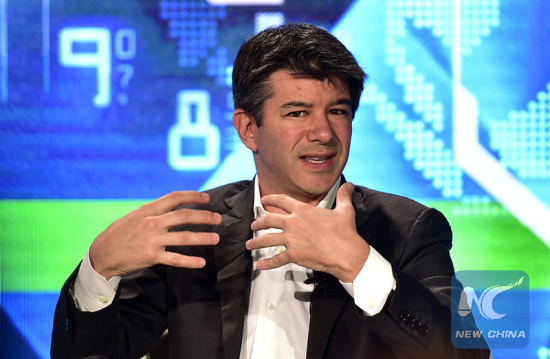
Travis Kalanick, current CEO of the transportation network company Uber, speaks during a session named "Technology Tipping Points: Digital Ubiquity" of the Annual Meeting of the New Champions 2016, or the Summer Davos Forum, in Tianjin, north China, June 26, 2016. (Xinhua/Yue Yuewei)
Ride-hailing firm Uber is looking to expand further into China's lower-tier cities, where business has been growing faster than in top-tier cities, CEO Travis Kalanick has said.
"We are seeing [second- and third-tier cities] grow far faster than the first-tier cities, so we are really excited about expanding there," said Kalanick in an exclusive interview with Xinhua during a meeting of the World Economic Forum, which is being held through Thursday in the northern Chinese city of Tianjin.[Special Coverage]
Uber has announced plans to expand its ride-hailing service to 100 Chinese cities this year. It now operates in nearly 60 cities, including many lower-tier cities also targeted by domestic rival Didi.
Uber has secured over 6 billion U.S. dollars in its latest funding round. Liu Zhen, Uber China's head of strategy, said this month that most of the money raised will be used to fund Uber's operations in China.
While the company has generated over 1 billion dollars in profits from its top 30 cities, Kalanick said it has not yet made money in any Chinese cities where the company operates, even though it provides more trips in China than any other country.
The strong demand for better transportation in lower-tier Chinese cities also gives Uber more breathing room than in bigger cities, where Didi dominates.
"I lose half an hour of sleep every night because of competition for China," Kalanick said.
A growing number of automakers are placing bets on ride-hailing firms. Toyota has invested in Uber, while Volkswagen has bought a stake in Gett in Europe and General Motors has backed Lyft in the United States.
To keep up with rival Didi, Kalanick said it must continue investment in China.
"We have to invest right now because we have a competitor that's also investing," he said.
Earlier this month, Didi announced 4.5 billion dollars in equity financing, including 1 billion dollars from Apple.
However, Kalanick would love to see the funding race end sooner.
"We all have to be sustainable at some point, and I can't wait till that happens. But for the time being, we are going to keep investing."


















































